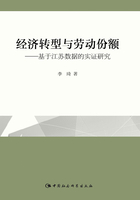
Abstract
China has got an impressive achievement in economic growth since 1978. With a rapid economic growth and transition, the decline of labor share in China has become an outstanding structural problem for promoting the well-off building. This book put forward a theoretic explain for the dynamic evolution of labor share in a dual transition society, based on many former studies. The model shows that a periodic decline of Chinese labor share appeared in the period of the dual transition, which resulted in the industrial structural change, system transition and technical progress embodied in capital by the investment driven growth mode. This book still points out that various effects can add up to make a sharp decline of labor share in the short run. With the weakening of effects above and the transformation of economic growth mode, the labor share in China will rise and converge to level the rich-country in the future.
Using several empirical methods, the theoretical model has empirically tested on the data of Jiangsu province, which data quality problems have been appropriate handled and some data have been estimated. The result shows that the official data underestimated the labor remuneration on one hand, on other hand, underestimated the decline of labor share in Jiangsu province. With theoretical framework put forward in this book, the main causes and mechanism of the decline in labor share have been clarification, and the effects on labor share from the change of industry structure, the adjustment of ownership structure and capital embodied technical progress are evaluated. We find that individual economic development, the sharply change of industry structure and rapidly development of privately owned economy in Jiangsu province are the important causes of the labor share decline, and the sharp decline of labor share can be explained by the significant capital-biased technical change. The result also shows that the effect on labor share by state-owned economy is far higher than the effect by non-public-owned economy.
According to the finding in this book, although the rise of labor share in China will be expected in future, but many economic policies and public policies should be taken by government, including to develop the third industry, improve the quality of workers, optimize the structure of public finance expenditure, accelerate the development of the labor market and improve the quality of statistical data, and so on.